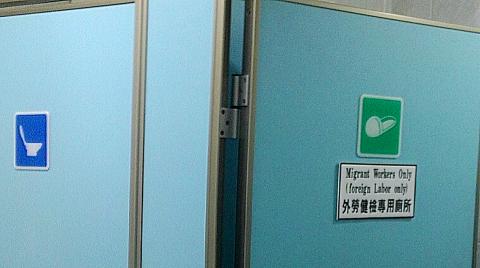A sign at a public hospital toilet that sparked controversy about possible segregation of migrant workers has been removed, the hospital said yesterday.
Klaus Bardenhagen, a German freelance journalist based in Taiwan who runs a Facebook page called taiwanreporter, posted a photograph on his page on Monday of a sign in the Zhongxiao branch of Taipei City Hospital that read in English: “Migrant workers only (foreign Labor only).”
He was shocked by the sign, Bardenhagen said in the post.

Photo: Courtesy of facebook.com/taiwanreporter.
While the Chinese characters on the sign state that the particular toilet was reserved for foreign workers undergoing their mandatory health check-up, he said, he was not sure if hospital authorities were aware that the English translation “[smells] of segregation.”
He also wrote that he thought most of the migrant workers who might use the toilet while having their health check-ups were unlikely to be able to read Chinese.
There have been some Facebook discussion threads responding to the photo, calling the sign ridiculous, discriminatory, even racist, while others said that the signage was designed to let people know that the squat toilet could be used to produce urine and stool samples, as opposed to the sit-down toilet next to it.
Bardenhagen said he did not think the sign was meant to be discriminatory, and that it was “probably just someone being thoughtless,” but “the clumsy English translation however could be perceived as [discriminating.]”
“How about ‘This toilet only for taking stool samples, please keep it free’ or something along those lines?” he wrote.
Some netizens questioned why the sign needed to single out migrant workers, since anyone going to the hospital for a health examination could use the squat toilet if they needed to provide urine or stool samples.
Asked for a response, the hospital said it “absolutely did not mean to discriminate,” and the sign had been posted for seven or eight years.
A hospital official said the signage was meant to help migrant workers identify the toilet and avoid congestion at the toilet facilities.
“It was to help streamline the flow, since many migrant workers have their health checks here. If there was no sign, people who were not undergoing health checks might use the toilet and that would slow the process,” a planning section chief surnamed Lin (林) said.
Migrant workers were welcome to use other toilets in the hospital too, she added.

MORE VISITORS: The Tourism Administration said that it is seeing positive prospects in its efforts to expand the tourism market in North America and Europe Taiwan has been ranked as the cheapest place in the world to travel to this year, based on a list recommended by NerdWallet. The San Francisco-based personal finance company said that Taiwan topped the list of 16 nations it chose for budget travelers because US tourists do not need visas and travelers can easily have a good meal for less than US$10. A bus ride in Taipei costs just under US$0.50, while subway rides start at US$0.60, the firm said, adding that public transportation in Taiwan is easy to navigate. The firm also called Taiwan a “food lover’s paradise,” citing inexpensive breakfast stalls

US PUBLICATION: The results indicated a change in attitude after a 2023 survey showed 55 percent supported full-scale war to achieve unification, the report said More than half of Chinese were against the use of force to unify with Taiwan under any circumstances, a survey conducted by the Atlanta, Georgia-based Carter Center and Emory University found. The survey results, which were released on Wednesday in a report titled “Sovereignty, Security, & US-China Relations: Chinese Public Opinion,” showed that 55.1 percent of respondents agreed or somewhat agreed that “the Taiwan problem should not be resolved using force under any circumstances,” while 24.5 percent “strongly” or “somewhat” disagreed with the statement. The results indicated a change in attitude after a survey published in “Assessing Public Support for (Non)Peaceful Unification

PLUGGING HOLES: The amendments would bring the legislation in line with systems found in other countries such as Japan and the US, Legislator Chen Kuan-ting said Democratic Progressive Party (DPP) Legislator Chen Kuan-ting (陳冠廷) has proposed amending national security legislation amid a spate of espionage cases. Potential gaps in security vetting procedures for personnel with access to sensitive information prompted him to propose the amendments, which would introduce changes to Article 14 of the Classified National Security Information Protection Act (國家機密保護法), Chen said yesterday. The proposal, which aims to enhance interagency vetting procedures and reduce the risk of classified information leaks, would establish a comprehensive security clearance system in Taiwan, he said. The amendment would require character and loyalty checks for civil servants and intelligence personnel prior to

The China Coast Guard has seized control of a disputed reef near a major Philippine military outpost in the South China Sea, Beijing’s state media said, adding to longstanding territorial tensions with Manila. Beijing claims sovereignty over almost all of the South China Sea and has waved away competing assertions from other countries as well as an international ruling that its position has no legal basis. China and the Philippines have engaged in months of confrontations in the contested waters, and Manila is taking part in sweeping joint military drills with the US which Beijing has slammed as destabilizing. The Chinese coast guard